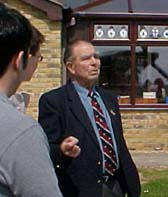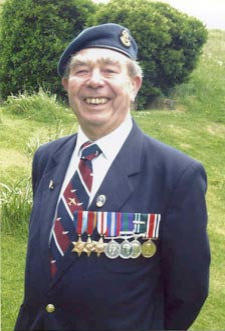Wartime Heritage
ASSOCIATION
The Reluctant Engineers' Coveted Wings
Flight Lt. Bernard Hyde
Bernard
Hyde
was
almost
fourteen
years
old
when
World
War
II
began.
Born
in
Sittingbourne,
Kent,
he
thoroughly
enjoyed
his
childhood,
especially
the
chance
to
enjoy
the
open
spaces
in
the
woods
and
fields
around
his
village.
His
childhood
came
to
an
abrupt
halt,
in
a
sense,
with
the
resounding
call
to
arms
throughout
Britain.
Recently
Mr.
Hyde
recalled
his
days
as a youth, anxiously awaiting the opportunity to serve his country.
My
father
decided
that
I
should
not
waste
my
technical
schooling
and
discussed
my
future
with
the
owner
of
a
light
engineering
company
who
agreed
to
employ
me
as
an
apprentice.
By
now
the
Battle
of
Britain
was
in
full
swing
and
like
many
other
residents,
time
was
spent
looking
towards the skies. It was here that I struck up a friendship that was to last for many years.
Peter
and
I
were
both
reluctant
trainee
engineers
and
both
had
one
ambition
only,
to
fly.
Peter
was
dead
keen
on
joining
the
Fleet
Air
Arm
as
a
pilot
but
fate
sent
him
into
the
RAF
where
he
won
those
coveted
Wings.
Peter
and
I
kept
our
noses
to
the
wheel
and
settled
down
biding
our time until we were old enough to volunteer for aircrew duties with the RAF.
There
was
a
slight
problem
because
the
age
for
joining
the
Air
Training
Corps
was
sixteen
and
my
sixteenth
birthday
was
not
until
September.
When
I
was
asked
how
old
I
was
I
replied,
without
batting
an
eyelid,
‘sixteen,
sir.’
Of
course
the
new
C.O.
knew
that
I
had
lied
but
allowed
me
to
sign
up
just
the
same.
We
were
in
and
well
on
our
way
to
joining
the
RAF.
Most
people
were
certain
that
the
war
would
be
over by Christmas. How wrong could we be?
Of
course
being
in
the
ATC
was
great
fun,
making
lots
of
new
friends
and
feeling
very
important
in
our
dog
collar
tunics
with
items
of
insignia
attached.
RAF
drill
and
discipline
were
most
important
and
I
enjoyed
learning
how
to
wear
a
uniform
and
march
like
a
real
airman.
I
became
so
keen
that
one
of
my
duties
was
to
instruct
new
recruits
the
elements
of
marching
and
how
and
whom
to
salute
In
1942
Peter
and
I
volunteered
for
aircrew
duties,
were
sworn
in,
took
the
King’s
shilling,
and
clutching
our
silver
badge
returned
home
determined
to
remember
our
service
numbers
without
which
airmen
could
not
get
paid
or,
for
that
matter
receive
uniform
or
food.
Even
today
if
somebody
claims
to
have
been
in
any
of
the
armed
forces
the
question
is
always
asked,
‘and
your
last
three?’ Any hesitation brings a query, were they really an airman or whatever.
Every
day
we
would
gather
and
wait
for
instructions,
we
were
all
desperate
to
receive
news
of
our
posting
overseas
to
continue
our
training.
I
suppose
we
were
concerned
the
war
would
end
before
we
had
become
operational.
How
silly,
we
might
have
been
killed
but
the
thought
never
occurred
to
us.
Time
passed
until
one
day
with
my
other
mates
our
names
were
called
and
we
left
our
cosy
billets
and
returned
to
the
camp.
Then
it
all
happened,
fourteen
days
embarkation
leave,
farewell
to
tearful
mother
but
with
a
light
heart
back
to
Heaton
Park.
Under
tight
security
(we
were)
marched
into
a
cinema
and
given
a
lecture
on
how
to
behave
in
Canada.
In
the
morning,
dressed
in
full
marching
order
clutching
a
pack
of
dubious
sandwiches,
we
boarded
buses
and
were
driven
to a railway station.
The
draft
of
RAF
aircrew
were
soon
on
board
the
'Aquatania'
and,
after
finding
our
troop
deck
and
dining
area,
were
soon
lining
up
at
the
shop.
For
seven
days
we
sailed
through
the
Atlantic,
going
south
and
then
west
and
then
a
bit
north,
all
the
time
the
ship
was
making
zig-zag
course.
I
vividly
remember
sitting
on
the
deck,
back
to
the
cabins
looking
at
the
sea,
one
minute
all
I
could
see
was
the
ocean,
looking
down
into
the
rollers,
next
I
was
looking
at
the
sky.
What
excitement,
we
had
seen
this
on
the
cinema
screen but here it was for real.
Once
cleared
for
mixing
with
civilization
the
time
came
to
be
posted
to
our
respective
training
stations.
Where
the
other
220
cadets
went
I
do
not
know,
my
group
of
30
trainee
Air
Bombers
boarded
a
proper
train
and
were
escorted
to
RCAF
Fingal,
No.
4
Bombing
and
Gunnery
School
wherever
that
might
have
been
(Fingal,Elgin
County,
Ontario).
But
we
were
not
bothered,
suffice
it
say
that we were to start our training and become Aircrew!
The
training
was
intense
and
the
weather
became
hotter.
In
classrooms
we
stuck
to
the
chairs
as
we
struggled
with
mastering
a
vast
amount
of
knowledge,
never
did
we
dream
that
so
much
was
involved
in
navigating
to
the
target,
identifying
the
target
and
dropping
a
bomb.
We
were
taught
the
art
of
plotting
courses,
signaling
by
Morse
code
and
using
a
signal
lamp,
aircraft
recognition,
meteorology,
gunnery
on
the
ground
and
in
the
air,
which
included
the
art
of
taking
a
Browning
'303'
machine
gun
to
pieces
and
reassembling it.
Ab
o
ut
a
week
before
graduation
day
six
cadets
from
the
course
were
summoned
to
the
Chief
Ground
Instructors
for
an
interview.
Ken
Hogg,
a
much
older
man
than
myself,
went
into
the
office
ahead
of
me
and
came
out
with
a
dejected
expression
on
his
face.
I
was
very
apprehensive,
certain
that
I
had
failed
the
course.
Ken
did
nothing
to
relieve
my
fears,
he
said
that
all
six
of
us
had
failed
and
would
be
returning
home.
I
was
called
into
the
office,
saluted
and
stood
to
attention
in
front
of
several
officers.
I
was
amazed
and
delighted
to
learn
that,
not
only
had
I
passed
the
course
but
that
I
had
been
commissioned
and
on
graduation
day,
following
wings
presentation
was
to
remove
rank
badges
and
eagle
shoulder badges and wear a white brassard indicating that I was now an Acting Pilot Officer.
By
now
we
were
anxious
to
return
home
and
join
an
operational
squadron
and
help
fight
the
war.
And
so
my
short
sojourn
in
Canada
came
to
an
end.
It
was
time
to
pack,
board
a
train
and
escorted
by
a
gaggle
of
Service
Police.
On
arrival
we
joined
the
Mauritania
and
where
I
found
myself
one
of
the
privileged
class,
sharing
a
cabin
with
five
other
new
Pilot
Officers
including
Ken
Hogg.
I
became
very
friendly
with
Ken
and
remained
so
until
he
died
six
years
ago.
He
turned
out
to
be
a
really
good
friend,
so
much
so that he became my daughter’s Godfather.
Bernard Hyde flew as Second Pilot on 271 and 8 Squadrons Transport Command, both in Europe and the Far East.
In
1945
he
met
his
future
wife
Marian,
and
they
resided
in
Kent,
UK.
Flight
Lieutenant
Bernard
Hyde
passed
away
on
September 2, 2020.



Bernard Hyde (RAF Veteran)
Bernard Hyde

copyright © Wartime Heritage Association
Website hosting courtesy of Register.com - a web.com company
The Reluctant Engineers' Coveted Wings
Flight Lt. Bernard Hyde


- World War I - Menu
- WWI Stories and Articles
- Photos - Yarmouth Soldiers
- Selection of World War I Songs
- WWI Casualties of Yarmouth, NS
- Those Who Served - Yarmouth, NS
- WWI Casualties Digby Co. NS
- WWI Casualties Shelburne Co. NS
- Merchant Mariners (1915) Yarmouth, NS
- Canadian Forestry Corps - Non Yarmouth Birth/Residence Enlistments
- US Draft Registry - Yarmouth NS Born


- World War II - Menu
- WWII Stories and Articles
- Telegraphist Air Gunners
- WWII Casualties of Nova Scotia
- US Casualties with NS Connection
- Far East/Pacific Casualties with NS Connection
- Merchant Navy Casualties Nova Scotia
- Nova Scotia WWII Casualties Holten Canadian War Cemetery
- D-Day Casualties - Nova Scotia
- CANLOAN Program Casualties - Nova Scotia
- Battle of the Bulge Casualties - Nova Scotia
- WWII Casualties Yarmouth NS
- Yarmouth Casualties - RCAF RAF Canadian Army WWII
- Yarmouth Co., Marrages WWII
- Casualties Non-Born/Residents with Connection to Yarmouth Co., Nova Scotia.
- WWII Casualties Digby Co., NS
- Non-Nova Scotian WWII Casualties Buried in Nova Scotia
- WWII RCAF Casualties Aged 16-18
- Brothers/Sisters Who Served - World War II













